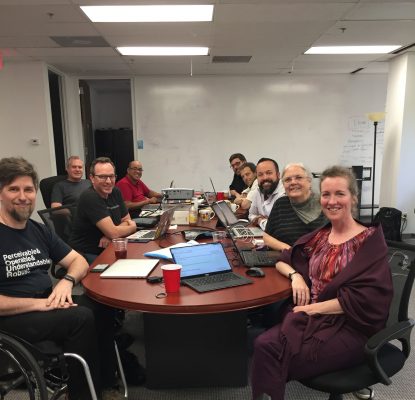
This post is about an unsung hero of web accessibility — the Education and Outreach Working Group (EOWG) of the World Wide Web Consortium (W3C) Web Accessibility Initiative (WAI).
The W3C WAI EOWG : Now you understand why I put ‘alphabet soup’ in the title of this post. But don’t let a clunky name deceive you. If you care about digital accessibility, whether you’re brand new to the space or an Accessibility Elder, you need to know EOWG and probably already rely on its work without being aware of it.
The mission of the EOWG is stated in the group’s W3C charter:
to develop strategies and resources to promote awareness, understanding, and implementation of web accessibility; and to support the work of other Web Accessibility Initiative (WAI) Working Groups.
When I was in Austin recently I was privileged to see this mission implemented in real time when I briefly sat in on an EOWG meeting. It reminded me of the tremendous resources the Web Accessibility Initiative offers to all of us at no cost. It reminded me that those resources don’t magically appear but reflect the dedication, commitment, and hard work of accessibility champions.
And it reminded me of the on-going work needed to make the intent of Tim Berners-Lee, founder of the web, a reality:
The power of the Web is in its universality. Access by everyone regardless of disability is an essential aspect.Tim Berners-Lee
Who is the EOWG
The picture in this post shows the people present at the Austin EOWG meeting. Beginning at the front left of the table, attendees were Nic Steenhout, Robert Jolly, Brent Bakken, Shadi Abou-Zahra, Chris O’Brien, Howard Kramer, James Green, Sharron Rush and Shawn Henry. Eric Velleman joined by phone from the Netherlands. Check out the complete list of all current EOWG participants.
I say current because the group is open to new participants. And non-‘participants’ can be involved through the group’s mailing list and GitHub. Read about the mailing list and participating in the EOWG.
New! Updated! Wonderful Web Accessibility Initiative (WAI) Website
The EOWG web page gives an overview of the tremendous work of these dedicated accessibility folks. An easy place to see the fruits of their efforts is in the newly designed Web Accessibility Initiative website. Not only is the site easier to navigate, but there are some very helpful new resources.
This update is a relief to me. I always knew and relied on the great info on the site, but honestly it was a little hard to find and visually out-dated. The re-design will make it so much easier to find the useful information and will be so much more inviting, especially to newcomers.
Web Access Resources That Shouldn’t be Missed
Every time I explore the the WAI website I find something useful for myself, to share with my negotiating partners in Structured Negotiation, or to include in my talks about the digital accessibility legal space.
Here are some of my favorites. I invite you to spend time on the WAI website, discover for yourself and share with others.
- Short videos to showcase the value of accessibility: “Essential for Some; Useful for All” videos
- The updated “Introduction to Web Accessibility” which is a great place to point people new to accessibility
- Accessibility Principles, another intro-level resource that is often overlooked
- Another great intro resource (and reminder for those long working in the space) is How People with Disabilities Use the Web, part of the “Accessibility Fundamentals” suite
- A portal to help organizations integrate accessibility throughout the web production process is Planning and Managing Web Accessibility
- Web Accessibility Tutorials provide in-depth guidance and helpful tips such as the Alt Decision Tree for learning when and how to write useful alt text for images
- A great resource for anyone making presentations and doing training: How to Make Your Presentations Accessible to All
- In virtually every talk I give, I find an opportunity to mention that true accessibility depends on people in many different roles – from designers and developers to managers and testers and many more. The redesigned WAI site recognizes this with a new page where visitors can select resources for different roles
Also new: At the bottom of most web pages is a section titled “Help improve this page.” With links to email the working group and participate on GitHub, it is easy for anyone to comment on resources.
The EOWG is at the Heart of What the Web is About
Why do the working group members, led by co-chairs Sharron Rush and Brent Bakken, do what they do? Why invest so much time and energy making it easier for everyone to use the web? Digital accessibility is a civil (human) right across the globe, and every day the Education and Outreach Working Group of the World Wide Web Consortium Web Accessibility Initiative is developing resources to help make that right a reality.
Why?
On the day I wrote this post I watched a great video about Tim Berners-Lee and the founding principles behind the world wide web. The video may contain the answer to the question of why the people on the EOWG work so hard: The web was designed as a tool for everyone. EOWG participants know it takes people doing hard work to make it so.